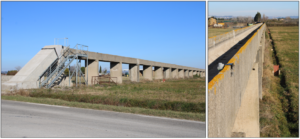The Site-iHubs are representative of the main irrigated cropping systems around the Mediterranean basin, of different agroclimatic regions (South-east Europe, Maghreb, Iberian Peninsula, South of France), and of reoccurring tensions over water resources. Irrigation systems in the pilot sites include gravity and pressurized systems, individual and collective systems, thus covering the diversity of situations of Mediterranean irrigated agriculture.

The pilot sites in the mid Guadalquivir valley in Spain, the Durance valley in France, North Morocco, Central Portugal (all four using mainly surface water), and the Thessalic plain in Greece (using ground water) are representative of extensive irrigated agriculture and therefore of the largest irrigated areas in the Mediterranean region. The sites in the southwest coastal area of Spain and the coastal area of Tunisia represent intensive agricultural systems producing high value crops in mild climates, using limited ground water resources. The Ghardaia region in Algeria is a paradigmatic example of horticultural production at the expense of nonrenewable ground water resources.
This careful selection of study sites covers the diversity of Mediterranean situations and therefore will allow exploring all levers needed to increase irrigation performance in the region.

